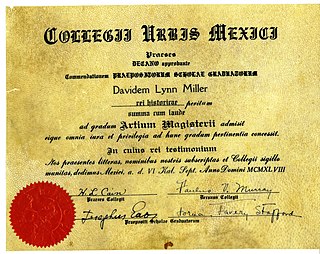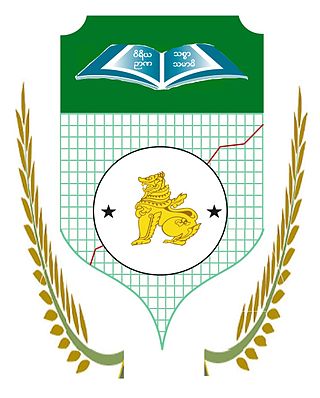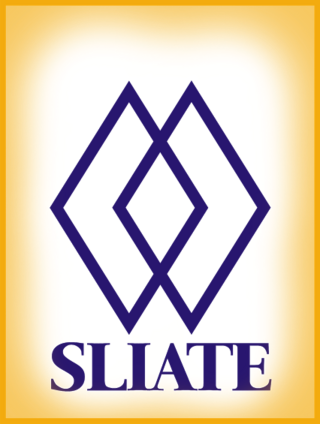Technical and further education or simply TAFE is the common name in English-speaking countries in Oceania for vocational education, as a subset of tertiary education. TAFE institutions provide a wide range of predominantly vocational courses.

A diploma is a document awarded by an educational institution testifying the recipient has graduated by successfully completing their courses of studies. Historically, it has also referred to a charter or official document of diplomacy.
An Institute of Technology (IT) is a type of higher education college found in Ireland. In 2018, there were a total of fourteen colleges that use the title of Institute of Technology, which were created from the late 1960s and were formerly known as Regional Technical Colleges. The exception to this was Dublin Institute of Technology which emerged independently of the Regional College system. The Technological Universities Act of 2018 allowed the merger of two or more IoTs into Technological Universities, which saw the creation of the Technological University Dublin in 2019; Munster Technological University and Technological University Shannon: Midlands Midwest in 2021; and Atlantic Technological University and South East Technological University in 2022.

The Open University of Sri Lanka is a national university in Sri Lanka. It is unique within the Sri Lankan national university system for being the only university to offer programs of study leading to certificate, diploma, degrees and postgraduate degrees up to PhD level through the Open and Distance Mode of Learning (ODL). The degrees awarded by the university are treated as equivalent to degrees awarded by any other Sri Lankan University under the preview of the University Grants Commission.
A graduate diploma is generally a qualification taken after completion of a first degree, although the level of study varies in different countries from being at the same level as the final year of a bachelor's degree to being at a level between a master's degree and a doctorate. In some countries the graduate diploma and postgraduate diploma are synonymous, while in others the postgraduate diploma is a higher qualification.
A higher diploma is an academic award in Iraq, Libya, the United Kingdom, Hong Kong, Ireland and Oman. In Iraq, it's one year after bachelor's degree. In Ireland it is a postgraduate qualification at the same level as the honours bachelor's degree. In the United Kingdom, the diploma is equivalent to higher tier (A*-C) GCSE.
A postgraduate diploma is a postgraduate qualification awarded after a university degree, which supplements the original degree and awards them with a graduate diploma. Countries that award postgraduate diplomas include but are not limited to Bangladesh, Barbados, Belgium, Brazil, Canada, Chile, Colombia, Germany, Hong Kong, Jamaica, Spain, Kenya, South Africa, Sudan, India, Israel, Ireland, the Netherlands, New Zealand, Nigeria, Republic of Panama the Philippines, Portugal, Russia, Pakistan, Poland, Saudi Arabia, Singapore, Sweden, the United Kingdom, Sri Lanka, Trinidad and Tobago and Zimbabwe. Level of education and recognition differ per issuing country.
An institute of technology is an institution of tertiary education that specializes in engineering, technology, applied science, and natural sciences.

Kegalle is a large town in Sabaragamuwa Province of Sri Lanka. It is located on the Colombo–Kandy road, approximately 78 km (48 mi) from Colombo, 40 km (25 mi) from Kandy, 32 km (20 mi) from Kurunegala and 46 km (29 mi) from Avissavella. It is the main town in the Kegalle District, which is one of two districts which comprise Sabaragamuwa Province. The town is governed by an Urban Council.

The National University of Cuyo is the largest center of higher education in the province of Mendoza, Argentina.

The Yangon University of Economics is the finest university of economics and business in Myanmar. Founded as the Section of Economics of Yangon University in 1924, the section became an independent university of higher learning in 1964. The University offers undergraduate and graduate degrees and diplomas, mostly in commerce, statistics and economics. It is also the best business school in the country, offering full-time, executive MBF, MHTM, MMM and MBA degrees.

La Rochelle Université is a French public university, based in La Rochelle. Founded in 1993, La Rochelle Université belongs to the Academy of Poitiers. In 2021, the university counted nearly 9000 students.

Higher Technological Institute is the first private technological institute in Egypt. It is a co-educational, land-grant, space-grant, research university located in 10th of Ramadan City. It is considered one of the top engineering institutions in the Middle East and the flagship campus of the Higher Technological Institute System which comprises four main campuses within the city – the Higher Technological Institute at Tenth of Ramadan City, the Higher Technological Institute at 6 October City, the Higher Technological Institute at Mersa Matrouh, and the Higher Technological Institute at Al Minya. More than 20,000 students are enrolled in many undergraduate, graduate, and professional programs. It is classified as a research university with very high research activity in environmental development. Founded by Prof. Mustafa Kamel, its present name was adopted in 1987 and classes were first held on September 21, 1988. It is noted for its strong engineering majors, business, computer sciences, communication disorders, creative writing, and history programs. It was founded by Prof. Mustafa Kamel on 27 October 1988, according to the law of non-profit national higher institutions No. 52 of 1970. The first academic year started on 21 September 1988. Total enrollment for the fall semester of 2014 was 21,976. The university campus comprises exactly 220 acres (89 ha), including Old Main, the first permanent academic building erected. The ratio of students to faculty is 40:1.
The Institution of Incorporated Engineers, Sri Lanka (IIESL) was established in 1977 and incorporated by a Sri Lankan Act of Parliament. The institute registers engineering technologists and Incorporated Engineers under the Sydney Accord.

The Sri Lanka Institute of Advanced Technological Education is a statutory body in Sri Lanka coming under the purview of the Higher Education Ministry and offering Higher National Diploma courses. At present, it manages and supervises eighteen provincial Advanced Technological Institutes throughout the island. The institute is traditionally known for its education in the accountancy and engineering. As per the recommendations of the Committee appointed by Prof. Wiswa Waranapala, Deputy Minister of Higher Education in 1994, the Sri Lanka Institute of Advanced Technical Education (SLIATE) was formed in 1995, under the Sri Lanka Institute of Advanced Technical Education Act No. 29 of 1995. In 2001, the name of the institution was amended as Sri Lanka Institute of Advanced Technological Education (SLIATE).

Sup'Com, founded in 1998, is the main school of educating engineers in telecommunications in Tunisia. It is affiliated to the University of Carthage and occupies the advanced ranks in the competitive examination for the access to the engineering studies.
Higher National Diploma in Engineering (HNDE) is a public institute in Sri Lanka mainly focused on higher education. Since 1986 the Higher National Diploma in Engineering (HNDE) program has been the pioneer in producing incorporated engineers for the local and international industry. The demand in the industry for HNDE students and the knowledge to work with internationally recognized modern equipment shows the quality and the standard of the course. Compared to local universities offering engineering degrees, ours as an engineering diploma awarding institute has a lot to be proud of in terms of the curriculum, facilities and employ-ability. The course content ensures that those who complete this program are satisfactorily employed both inside Sri Lanka and abroad.
Samarajeewa "Sam" Karunaratne, FIET, FIEE, FIESL is an emeritus professor of engineering and a leading Sri Lankan academic who is the founding chancellor and president of the Sri Lanka Institute of Information Technology and the former vice-chancellor of the University of Moratuwa. He has held a number of other appointments in the field of higher education in Sri Lanka, including senior professor of electrical engineering and dean of the Faculty of Engineering and Architecture, president of the Institution of Engineers, Sri Lanka. Karunaratne is a pioneer in the development of the use of computers in the field of engineering and played an important role in the development of information technology education and industry in Sri Lanka.
Engineering is the most sought after subject areas among Sri Lankan students. The engineering degrees make up less than 2% of the bachelor's degrees in Sri Lanka.








